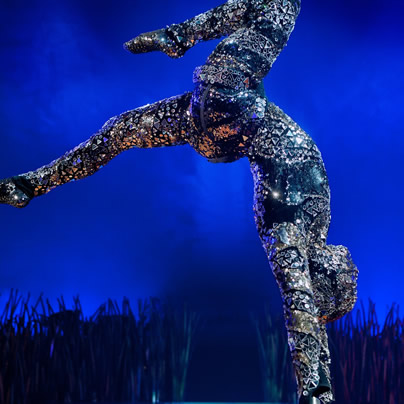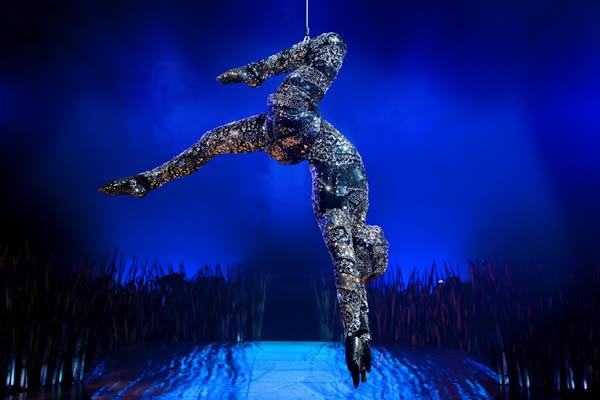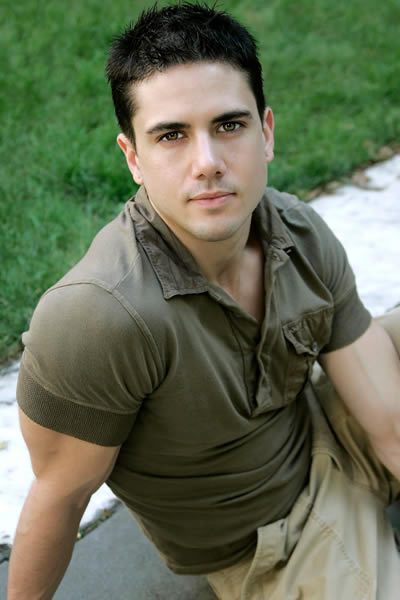Arts & Entertainment
Return to form
Gay Cirque performer in peak shape after conquering addictions


Joe Putignano says his passion for gymnastics never went away. Even in the throes of heroin addiction, he replayed his old routines in his mind. (Photo courtesy Cirque du Soleil)
Cirque du Soleil’s ‘Totem’
Aug. 15-Sept. 30
Plateau at National Harbor
201 Harbor View Ave.
Tickets: $40-$153
cirquedusoleil.com
Cirque du Soleil gymnast Joe Putignano prepares for his character in the big top show “Totem” by donning a dazzling costume containing eight pounds of Swarovski crystals. When he enters the arena, he descends from the ceiling illuminated in light.
“Totem,” which opens at the National Harbor on Wednesday, is a story about evolution, combining the scientific theories and myth that humans have developed about it. Putignano’s character, the Crystal Man, is the spark of hope and light that begins the journey. He says the character embodies Charles Darwin’s quote, “Light will be thrown on the origin of man.”
As he performs, audience members can sense the intensity and passion in the movement of his body. Company manager Jeff Lund describes him as a “human disco ball.” Putignano says, “It is difficult, performing in a heavy costume is like running a small machine and it does take a lot of practice.”
However, the audience will not realize that less than 10 years ago, the spark in Putignano’s life almost went out. At age 17, he began using various drugs, including ecstasy, cocaine and later heroin, and would not be clean again until he was around 29. When he was 19, he quit gymnastics thinking he would never return to the floor.
“I felt I betrayed myself,” he says. “I never wanted to do a handstand or a split again. It was like a divorce.”
Lund, who has worked with Putignano for almost two years and is in charge of almost all aspects of “Totem,” says Putignano’s performances these days defy his background.
“He is a world-class athlete,” he says. “His story is a very inspiring one.”
Putignano began gymnastics when he was around 8 years old, after watching the Olympic gymnasts compete on television. He says as he watched them, he knew he wanted to be doing this for the rest of his life.
He was immediately very good and began competing around the U.S. and went to the Olympic Training Center in Colorado Springs twice when he was 11 and 13.
“As a child you bend to the laws of passion,” Putignano says. “You can’t imagine as many people as passionate as you. Later you see that it is a sport and there are rules, and now everybody sees your imperfections.”
As a Boston native, he says competing in New England is different from competing with top gymnasts from around the country. For a young Putignano, the mounting pressure to reach perfection and to compete began to wear on him. Especially, as he describes, an injury can completely derail a gymnast from his path very quickly.
“We know that our art form is fleeting, we can’t take it for granted because it can leave you in a moment,” he says.
He says growing up with gymnastics made it feel like his church. Though he did not come out until he was 19, being gay and a gymnast was never an issue for Putignano. He says, “The floor has no sexuality.” But the increased competition felt like a violation of his sacred space.
Putignano began taking ecstasy and cocaine during the “’90s rave era” and eventually quit gymnastics when he was a sophomore in college.
“To be a gymnast, one has to conquer perfect precision and control over the physical capacities of the body,” he says. “To be an addict, one must surrender this control over to the underworld, and I couldn’t keep them both together.”
After walking away from competing, Putignano plunged into what would turn out to be a very dark 10 years. He moved to New York in 1999 and began using heroin. He says his experiences with the drug were full of “bitter irony.”
“The more I shot up to escape the memories of my once beautiful pure sport, the quicker I nodded out into a dreamscape of performing my old gymnastics routines,” he says. “I was shooting up to escape the memory of my failed destiny, only to be flooded into an unconscious heroin state where I performed my gymnastics skills over and over. If there was ever a layer of Dante’s inferno, this was it.”
In New York City, he worked various jobs like waiting tables and modeling. He tried to stop several times with no success.
“Eventually, I was getting older and hadn’t gotten any better and over the years I saw the tiny spark of light inside me dimming down to nothing,” he says. “That one thing which made me myself was going to burn out forever. The fear of losing this light kept me constantly chasing sobriety.”
As time went on, Putignano ended up homeless and overdosed twice where he was declared dead both times.
“At the time of my overdoses, I was so far from reality that I was actually strengthened by my experience because I believed I had beat death,” he says.
This cycle continued until he was 26, when he was in rehab for the fifth time. One day, he went up into his room and began doing headstands. Though it would be another three years before he was completely clean and intense training was required to get back in shape, his interest was rekindled. But sobriety did not come easily.
“When I started to audition for shows, I was still not completely clean,” Putignano says. “I would be three months clean and relapse.”
Putignano’s second chance in gymnastics came when he got clean and began performing at the Metropolitan Opera House and Broadway Bares. A pivotal turning point came for him when he was eventually hired by Twyla Tharp to perform in her Broadway show “The Times They Are A Changin,’” based on Bob Dylan’s music. This was important to Putignano, as he was rejected from the show twice before being hired.
“It was such an important point in my sobriety. Tharp is an icon in the dance world,” he says.
While performing on Broadway and the Opera house, he connected with Robert Lepage, one of the creators of Cirque du Soleil. Lepage knew Putignano’s background and asked him if he would like to be part of show. Putignano says it is not a coincidence that his character should represent hope and light in the world.
“For myself, my character represents my sobriety, my hope, my faith and the relentless power of the human spirit,” he says.
Now six days a week, he brings that light to others through the 4,000 pieces of reflective glass. And just like Putignano, Lund says the costume is far more durable than it seems.
“At the end of the night, it gets thrown in the wash with everything else,” he says. “Sometimes pieces will fall off, but we have people who will reattach them when it happens.”
With a tight performing schedule and around six years of sobriety under his belt, Putignano says remaining sober is still a challenge.
“I would love to say that touring has been easy for me in sobriety, but the truth is, it isn’t,” he says. “Some humans are like trees and they need to stay close to their roots. My sober network is in New York City and it has been difficult without them.”
Despite the challenge, he has remained clean so far and he is able to use his experiences to be an emotional support for other performers. He says since he has been in dark places himself, he can be empathetic to others’ emotional struggles.
Lund describes the “Totem” performers and crew as one big family. Nationality and sexuality do not matter there, he says.
“For me as a manager, I try to avoid making lines between artists and technicians and so on, “ he says. “I know in other companies it may be like that, but I like my entire crew to be connected with each other. This is made easy since we are on the road together for so much out of the year.”
What keeps Putignano going is the thought that many who have been in his position have not received a second chance.
“I have to continue to carry the torch for the dead, for those who didn’t get a second chance and I have to do everything in my power to bring hope to the hopeless,” he says. “I was once the hopeless.”
Another Cirque show to open in Baltimore
“Dralion,” Cirque du Soleil’s acrobatic show that fuses influences from the East and the West, is opening in Baltimore on Aug. 22 and runs through Aug. 26.
The name of the show represents the different parts of the world combined— it’s the combination of the dragon, representing the East, and the lion, representing the west. It mainly draws on the 3,000-year-old tradition of Chinese acrobatics combined with the more modern Cirque du Soleil twist, according to the website.
In the show, the four elements of nature come to life. At first they are separated and have their distinct colors. Air is blue, water is green, fire is red and earth is ochre. When they are combined balance is achieved.
“Dralion” is one of Cirque du Soleil’s arena shows, and is performing at the 1st Mariner Arena (201 West Baltimore St.) Tickets range from $40 to $165. For more information, visit cirquedusoleil.com.
a&e features
Eastern Shore chef named James Beard Finalist
Harley Peet creates inventive food in an inclusive space

In a small Eastern Shore town filled with boutiques, galleries, and the occasional cry of waterfowl from the Chesapeake, Chef Harley Peet is most at home. In his Viennese-inflected, Maryland-sourced fine-dining destination Bas Rouge, Peet draws from his Northern Michigan upbringing, Culinary Institute of America education, and identity as a gay man, for inspiration.
And recently, Peet was named a James Beard Finalist for Best Chef: Mid-Atlantic – the first “Best Chef: Mid-Atlantic” finalist representing the Eastern Shore.
Peet, after graduation from the Culinary Institute of America, took a position as sous chef at Tilghman Island Inn, not far from Bas Rouge. Falling in love with the Eastern Shore, he continued his passion for racing sailboats, boating, gardening, and fishing, and living his somewhat pastoral life as he opened Bas Rouge in 2016 as head chef, a restaurant part of the Bluepoint Hospitality group, which runs more than a dozen concepts in and around Easton, Md.
Coming from a rural area and being gay, Peet knew he had his work cut out for him. He was always aware that the service and hospitality industry “can be down and dirty and rough.”
Now as a leader in the kitchen, he aims to “set a good example, and treat people how I want to be treated. I also want to make sure if you’re at our establishment, I’m the first to stand up and say something.”
The Bas Rouge cuisine, he says, is Contemporary European. “I’m inspired by old-world techniques of countries like Austria, Germany, and France, but I love putting a new spin on classic dishes and finding innovative ways to incorporate the bounty of local Chesapeake ingredients.”
His proudest dish: the humble-yet-elevated Wiener Schnitzel. “It is authentic to what one would expect to find in Vienna, down to the Lingonberries.” From his in-house bakery, Peet dries and grinds the housemade Kaiser-Semmel bread to use as the breadcrumbs.
Peet works to support the LGBTQ community inside and outside of the kitchen. “I love that our Bluepoint Hospitality team has created welcoming spaces where our patrons feel comfortable dining at each of our establishments. Our staff have a genuine respect for one another and work together free of judgment.”
Representing Bluepoint, Peet has participated in events like Chefs for Equality with the Human Rights Campaign, advocating for LGBTQ rights.
At Bas Rouge, Peet brings together his passion for inclusion steeped in a sustainability ethic. He sees environmental stewardship as a way of life. Peet and his husband have lived and worked on their own organic farm for several years. Through research in Europe, he learned about international marine sourcing. Witnessing the impacts of overfishing, Peet considers his own role in promoting eco-friendly practices at Bas Rouge. To that end, he ensures responsible sourcing commitments through his purveyors, relationships that have helped create significant change in how people dine in Easton.
“I have built great relationships in the community and there’s nothing better than one of our long-standing purveyors stopping in with a cooler of fresh fish from the Chesapeake Bay. This goes especially for catching and plating the invasive blue catfish species, which helps control the species’ threat to the local ecosystem.
Through his kitchen exploits, Peet expressed a unique connection to another gay icon in a rural fine-dining restaurant: Patrick O’Connell, of three Michelin starred Inn at Little Washington. In fact, Peet’s husband helped design some of O’Connell’s kitchen spaces. They’ve both been able to navigate treacherous restaurant-industry waters, and have come out triumphant and celebrated. Of O’Connell, Peet says that he “sees [his restaurants] as canvas, all artistry, he sees this as every night is a show.” But at the same time, his “judgment-free space makes him a role model.”
Being in Easton itself is not without challenges. Sourcing is a challenge, having to either fly or ship in ingredients, whereas urban restaurants have the benefit of trucking, he says. The small town “is romantic and charming,” but logistics are difficult – one of the reasons that Peet ensures his team is diverse, building in different viewpoints, and also “making things a hell of a lot more fun.”
Reflecting on challenges and finding (and creating) space on the Eastern Shore, Peet confirmed how important it was to surround himself with people who set a good example, and “if you don’t like the way something is going, fuck them and move on.”

Team DC, the umbrella organization for LGBTQ-friendly sports teams and leagues in the D.C. area, held its annual Night of Champions Awards Gala on Saturday, April 20 at the Hilton National Mall. The organization gave out scholarships to area LGBTQ student athletes as well as awards to the Different Drummers, Kelly Laczko of Duplex Diner, Stacy Smith of the Edmund Burke School, Bryan Frank of Triout, JC Adams of DCG Basketball and the DC Gay Flag Football League.
(Washington Blade photos by Michael Key)




















The 2024 National Cannabis Festival was held at the Fields at RFK Stadium on April 19-20.
(Washington Blade photos by Michael Key)
















Covering the @NatlCannaFest at RFK Stadium for @WashBlade . Stop by the LGBTQ+ booth and pick up a paper if you are here. pic.twitter.com/is7hnsaPns
— Michael Patrick Key (@MichaelKeyWB) April 20, 2024
-

 State Department2 days ago
State Department2 days agoState Department releases annual human rights report
-

 Maryland4 days ago
Maryland4 days agoJoe Vogel campaign holds ‘Big Gay Canvass Kickoff’
-

 Politics3 days ago
Politics3 days agoSmithsonian staff concerned about future of LGBTQ programming amid GOP scrutiny
-

 The White House1 day ago
The White House1 day agoWhite House debuts action plan targeting pollutants in drinking water









